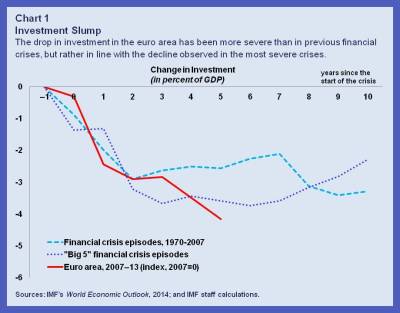From the International Monetary Fund's iMFdirect blog:
Investment in the euro area, and particularly private investment, has
not recovered since the onset of the global financial crisis.
In fact, the decline in investment has been much more drastic than in
other financial crises; and is more in line with the most severe of
these crises (see Chart 1). The October 2014 World Economic Outlook
showed that many governments cut investment because their finances
became strained during the crisis. In addition, housing investment
collapsed in some countries, reflecting a natural scaling back after an
unsustainable boom. But what is holding back private non-residential
investment?

In an IMF Working Paper,
we have looked at the driving factors of private non-residential
investment in seven euro area countries – Germany, France, Spain, Italy,
Ireland, Portugal and Greece – and the euro area as a whole until 2013.
We find that low growth is definitely a big part of the story. But
crisis legacies, such as high corporate leverage, financial constraints,
and policy uncertainty are also holding back investment in some
countries.
A vicious “Catch 22”
Much of the dip in investment since the crisis can be explained by
low or negative growth. Effectively, this creates a “Catch 22”: growth
is weak partly because investment is low, but investment is low because
companies don’t have sufficient demand for their products. The shortfall
in investment dims both short- and medium-term prospects for the euro
area. Countries need higher investment to raise demand now, increase the
productive capacity of their economies, and secure permanently higher
incomes. Yet, without higher demand, firms are unwilling to invest.
This is particularly true for Spain, where changes in real GDP
explain the variation in investment well. But in many euro area
countries, investment has declined by more than suggested by the changes
in output since the beginning of the euro area debt crisis....MORE
